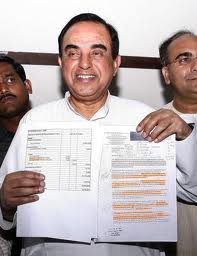
New Delhi, April 29: The government has rejected the allegations levelled by Janata Party chief Subramanian Swamy against Home Minister P. Chidambaram in the Aircel-Maxis equity issue referring to them as “totally baseless”.
Last week, Dr. Swamy had charged Mr. Chidambaram, the then Finance Minister, of delaying permission for the sale of Aircel to Malaysia-based Maxis in 2006 to benefit his son Karti Chidambaram.
In a statement issued here the government released records of Foreign Investment Promotion Board (FIPB) on the issue and said, “It will be abundantly clear that there was no delay whatsoever. It is unfortunate that baseless allegations should be made without verifying the facts.”
Dr. Swamy had alleged that the proposal of M/s Global Communication Services Holdings Ltd, Mauritius (a wholly owned subsidiary of M/s Maxis Communications Berhad) to acquire 73.99 per cent equity in M/s Aircel Ltd was delayed by the then Finance Minister in order to benefit certain persons.
The release said, on January 1, 2006, that Global Communication Services Holdings Ltd acquired 26 per cent equity in Aircel Ltd through the automatic route and on January 30, 2006 the applicant applied for enhancing its equity in M/s Aircel Ltd from 26 per cent to 73.99 per cent.
“The application was processed in the normal course and the Ministries and Departments concerned took the normal time of four to six weeks to offer their comments. The proposal was included in the agenda notes circulated on February 17, 2006.
“On March 7, 2006, the matter was placed before the meeting of the FIPB. DoT conveyed its support to the proposal at the meeting. FIPB recommended the proposal for approval on March 7, 2006 and the file was moved by Deputy Secretary on March 10, 2006.
“The minutes of the FIPB meeting were placed before the then Finance Minister on March 13, 2006 and he approved the same. The formal letter of approval was issued by the Ministry of Finance on March 20, 2006.” The release stated that from the sequence of events it is abundantly clear that there was no delay whatsoever. “It is unfortunate that baseless allegations should be made without verifying the facts.”





Comments
Add new comment